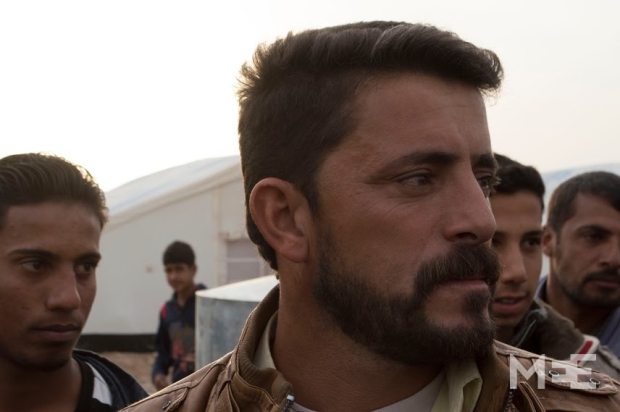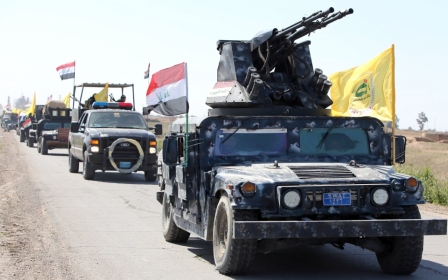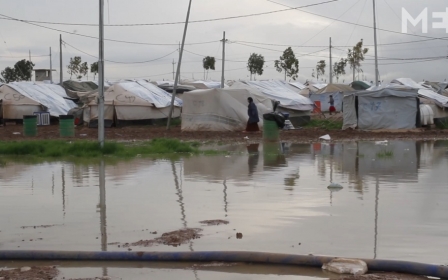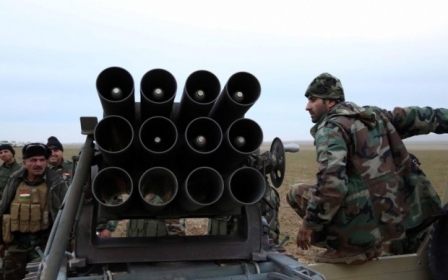Iraqi Sunnis in Diyala tell of fleeing Shiite militia in terror

Khanaqin, IRAQ – Kareem Abbas is almost half the size of most the men around him. He struggles to push through the crowd, which has formed a compact circle around a Middle East Eye interview, desperately extending his phone before him.
“Please! Please, look!” He yells frantically, interrupting the interview. “Look at what they did to my brothers!”
The video is already playing when he thrusts the phone forward. The scene on the video is chaos. People on the small screen are running, the shot is shaky and erratic, but clear – the people running are dropping one by one. A shot fires and another person falls to the ground. Gunshots are the only thing that can be heard above the piercing noise of screams.
Abbas’s voice resonates from the phone’s speakers: “They’re killing them, they’re killing all the people here,” he can be heard screaming in Arabic. A woman on screen turns her head to the side, looking at Abbas, she starts to scream and falls to the ground as she is shot in the back. Holding the camera phone, Abbas continued to run.
Abbas and two of his brothers got away that day. His other six brothers were killed in the chaos.
While the Islamic State took Abbas’s village in Diyala Province months before, the gunmen were not the Sunni militants. In fact, when the Islamic State came to town, Abbas didn’t run. Rather, Abbas thought he could keep his head down, avoid trouble and dodge becoming one of the over two million internally displaced persons (IDPs) living in tents in makeshift camps across northern and central Iraq.
His plan worked. The Islamic State left Abbas and his family alone.
According to Abbas, the massacre didn’t start until the day the Islamic State was pushed out. The Badr Brigade, an Iranian-funded Shiite militia with a force between 10,000 and 15,000, advanced on his village, and forced the Islamic State out of his hometown in a move the Iraqi central government called liberation.
Human Rights Watch (HRW) has documented several cases of kidnap and summary executions by the Badr Brigade in Diyala province.
“Iraqi civilians [in Sunni areas] are being hammered by ISIS and then by pro-government militias in areas they seize from ISIS,” Joe Stork, HRW’s deputy Middle East and Africa director, said in a statement.
Visibly upset with hands shaking, Abbas tells MEE that on that first day militiamen gathered the villagers together, crosschecking their identification with names of known Islamic State fighters. Terrified, Abbas and other adult male villagers co-operated with the armed men.
“But then a man with a facemask approached the fighters,” Abbas explains. “He started screaming at them ‘Are you really doing this? We know they [the villagers] are not with the Islamic State. We are here to kill.’”
According to Abbas, the masked man raised his gun to the nearest villager and fired several shots at point blank range into the man – the rest of the militiamen started shooting indiscriminately.
“Seventy-one people were killed, and that’s without counting the missing,” Abbas continues. “My brothers are dead.”
Abbas’s village in Muqdadiyya remains under the control of the Badr Brigade. Afraid to return, Abbas lives in a Khanaqin IDP camp – a muddied field, cramped with lines of tents, in Diyala province, central Iraq.
The IDP camp is full of Sunni Arabs from Diyala. Individual’s crowd round recounting their personal accounts of the Badr Brigade – massacres they’ve witnessed and escaped from, their homes destroyed by the Shiite militia, their families threatened.
While at Khanaqin camp, food and water are scarce, one man asks just for anti-depressants. "This is the one thing, after everything we have been through, that we need," he says.
Ghassan Ajabouie nodded his head in agreement. Everyone in the camp has witnessed death and destruction at the hands of the Shiite militia, he says, everyone is terrified of the Badr Brigade.
“I am terrified, I will tell you with no hesitance,” Ajabouie says. “Everyone here is scared. Sharaban, my town, is free [of Islamic State] but no one has returned. Why? Because they are scared of this militia.”
Ajabouie is animated. Two dozen camp residents hang onto his every word, as though happy to let him speak on their behalf. Ajabouie has been at Khanaqin IDP camp for the past nine months. He fled when IS took his hometown, but not everyone did, he said. Since the Badr Brigade pushed the Sunni militants out in January, residents who kept a low profile under IS have fled to Ajabouie’s camp. “Massacres have happened in my town from the Badr Brigade,” he says. Returning home, despite the abandonment of the town by IS, is not an option.
“I would rather stay here in this camp and eat dirt than return,” he says. “I will eat dirt, and not just me, all of the people here, would rather do this than return. I live an hour away, but even if I had a palace there I would prefer this life and this tent here, than risk my life going home.”
Ajabouie says his brother was captured by IS militants seven months ago. He hasn’t been heard of since. The Badr Brigade, and IS, are the same, he says.
“If the Shiite militia see me they will cut my head off, if Daesh see me they will kill my brother,” he continues using the Arabic acronym for the Islamic State.
Abbas, who’s phone is now silent, but still grasped tightly in his right hand, stands beside the much taller Ajabouie, refusing to be budged out of position by the crowd.
“They’re both the same [IS and the Badr],” Abbas says, reiterating Ajabouie. “They carry out the same massacres, but people don’t seem to know this,” he says, raising his clasped hand, phone cocooned by dirtied and calloused fingers.
“The Badr came into my village as well,” Wissam Ismayai shouts out, “even the Israelis did not do to the Palestinians what the Badr did to us.”
Ismayai, with red-checkered scarf neatly packed around the top of his head, talked of Sinsin, his small village in Diyala – which he said is now occupied by Badr Brigade forces – as though returning in the future is not an option.
Ismayai is the patriarch of his extended family, the majority of whom now reside in the tented community he has taken refuge in. An end to his family’s suffering and to the life of an IDP will only come with a guarantee of their safety, something Ismayai believes is a long way off.
“We have no guns, we are defenceless,” Ismayai told MEE. “I now own nothing, they [Badr] destroyed my house, they took everything, but I just ask for one thing. The guarantee that my family will be safe - with that then I will go home, even though we have more here in these tents than we do in Sinsin.”
New MEE newsletter: Jerusalem Dispatch
Sign up to get the latest insights and analysis on Israel-Palestine, alongside Turkey Unpacked and other MEE newsletters
Middle East Eye delivers independent and unrivalled coverage and analysis of the Middle East, North Africa and beyond. To learn more about republishing this content and the associated fees, please fill out this form. More about MEE can be found here.





